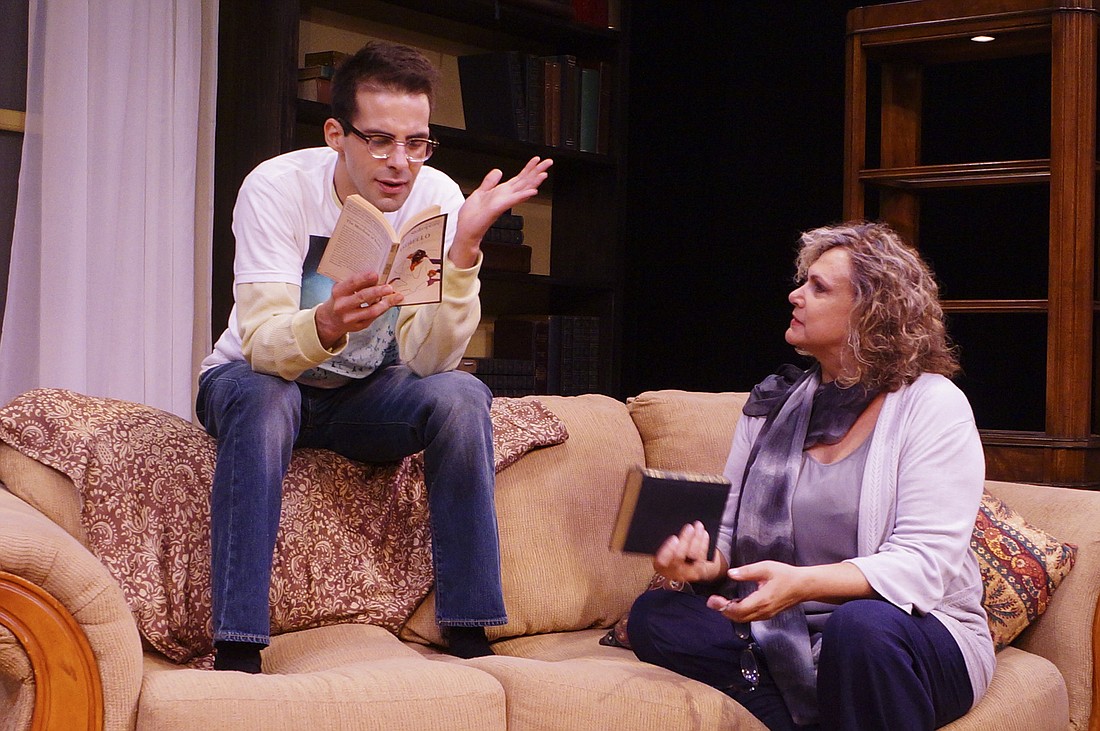- May 6, 2024
-
-
Loading

Loading

According to Harold Bloom, Shakespeare invented the modern concept of what it means to be human. John Murrell’s “Taking Shakespeare” puts that theory to the test on the Florida Studio Theatre stage. The plot, anon …
Murph (Graciany Miranda), a 24-year-old freshman, is on the verge of flunking out. Video games are his delight. Words are his problem, especially Shakespeare’s. His mother (the dean of the humanities department) sends him for private tutoring sessions with an unnamed “Prof” (Kate Alexander). She’s a female Kingsfield who turns the tumblers of his mushy mind. Her method: a mix of Socratic dialogue and empiricism. (I.e.: the play’s the thing. To grasp the meaning of a scene — play it!) Prof tosses Murph’s assigned reading (a mish-mash of comedies) and goes straight for “Othello.” Act by act, scene by scene, they hash it out. At first Murph struggles; he’s like a baby Popeye spitting out his spinach. Then he discovers he really likes Shakespeare — and the Bard makes him stronger. Along the way, the details of Prof’s life emerge. Her sweat-the-details approach isn’t the academic flavor of the month. She believes students should be consumed. The administration considers them consumers — and tries to keep them (and their parents) happy with easily digestible lessons.
“Taking Shakespeare” offers its own set of lessons. Murrell wants you to chew them over, not swallow them whole. Tom Keys’ direction steers clear of didacticism. Murph and Prof feel like two human beings, talking, thinking and interacting. In Keys’ hands, the play never feels like a lecture.
Props also to the props. Production designers Isabel and Moriah Curley-Clay nicely convey Prof’s amazing tolerance for ambiguity with their shabby and not-so-genteel set of Prof’s chaotic, book-stuffed, disorganized home. Prof may know her Shakespeare. Feng shui? Not so much.
Within this shabby arena, Murph and Prof hash out their lessons like two boxers circling in the ring. Alexander’s Prof isn’t exactly rude — but she doesn’t suffer fools gladly. Murph is more fool than not when she first meets him. Prof wrings the fool out of him, and subtly gives you a sense of the tumblers spinning in her own consciousness — all the mostly unspoken thoughts, ambitions, passions and hurts going on behind her eyes. It’s a tough-minded performance, full of gravitas. Miranda’s Murph (an echo of Beckett’s Murphy, I suspect) is an unformed mass of potentiality at the start. If he’s a fool, his is the folly of a sleeping mind.
Nobody’s ever pushed him. Prof pushes him. With excellent physical acting and a fine sense of timing, Miranda brilliantly conveys the sparks connecting in his mind that result. Sparks of self-consciousness — and a consciousness of the other. All those ah-ha moments. (Iago is a nihilist, not a racist. He’s playing the race card to manipulate Roderigo. A-ha!) Murphy wakes up. Thanks to Shakespeare’s words (and Prof’s mental midwifery) a fully human intellect is born. But of course, there’s a cost.
At the end, Murph comes up with an original interpretation of Iago’s character and motives. (No small thing. The problem of Iago is the problem of evil and nothing less.) Prof draws him out about the details of the gaming universe of Bandwitch (a massive, multiplayer game which only exists in the play). Prof doesn’t patronize — but Murph still wonders about her curiosity. We find out that she’s been the loser of a shabby academic game. The problem of evil exists in this world, too. And Shakespeare has a solution for that as well. (The answer’s in the scene. We won’t spoil it.)
Let’s just say it’s a painful answer.
But, thanks to Prof and the Bard, Murph is a reinvented human being.
And he can take it.
IF YOU GO
“Taking Shakespeare” runs through Aug. 17, at Florida Studio Theatre’s Gompertz Theatre, 1247 First St., Sarasota. Call 366-9000 or visit floridastudiotheatre.org for more information.